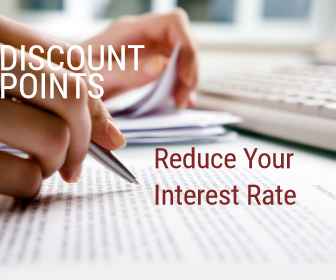Mortgage Discount Points and What You Need To Know About Them

What are discount points, and how do they work? Juggling the financial burdens of everyday life while trying to secure a mortgage to buy a home can be very difficult. There are plenty of budgetary unknowns to anticipate over a 10 or 25-year period (or longer), so it helps to have as much information as possible.
One of the financial options you should know and consider is purchasing points to lower the interest rate on your loan!
Is it worth paying discount points to secure a lower interest rate on your mortgage? Maybe!
Discount points are fees
you pay your financial lender at closing to secure a lower interest rate on your home loan.
Points are calculated relative to the loan amount, each equaling one percent of the loan. For example, one point on a $100,000 loan is $1,000. Two points would be $2,000, and three points $3000.
However, points don't have to be round numbers – you can pay fractions of a percentage. For example, .275 points would equal $275), 0.75 points ($750), or even 0.125 points ($125). Whatever the amount, it is paid at closing and increases your closing costs. See an example here!
Buying discount points to lower your loan interest rate can be a good idea
but only for some home buyers, not all. Depending on the specifics of your loan and your financial situation, buying discount points to lower your interest may save you money, or it may not. In some cases, the savings may be so inconsequential that buying the discount points may not be worth the extra financial burden or cash flow stress it causes.
So how do you know whether or not buying discount points is worthwhile?
The length of time you intend to keep the loan is key to finding the answer to that question. Once you have that information and assuming no unexpected life expenses, the answer will be revealed with a few simple calculations.
Unfortunately, life often dishes out the unexpected, which sometimes costs a lot of money, so it's impossible to have a foolproof plan. The good news is the calculations are still reasonably straightforward. Barring any major catastrophes, they give you a good idea about whether it makes sense to take advantage of discount points to reduce your loan interest rate.
Where to start
Begin by using an online mortgage calculator to determine your monthly payment at the interest rate if you do not purchase discount points from your lender. Then do the same calculation to determine how much your monthly payment would be if you decide to buy discount points.
Subtract the first amount from the second to determine the monthly difference you could save. Then divide the amount it would cost to buy discount points at closing by the monthly amount saved. The resulting figure represents the additional months you would have to keep the loan to break even or recover the cost incurred using points. If you do not intend to stay in the house long enough to recover the cost, you may not want to buy the discount points.
By using an amortization schedule (also available online or from your financial institution) to compare the economic impact of both loan scenarios, you may discover that the reduced-rate loan has a nominally lower principal balance at the end of the discount point cost recoup period, which may also play into your decision.
Winding things up
Finally, consider the tax advantages of purchasing discount points from your lender. The cost of real estate discount points is deductible in the year paid. Of particular note, buyers can deduct the discount points cost even if the seller pays for them.
While there are pros and cons to buying discount points from your home financing lender, your final decision must be based on your specific needs and financial situation. Speak to your financial advisor or lending institution to decide on the best course of action to ensure you can pay off your loan in the best possible way.
Other pages you might like
Home Page > Real Estate Articles >> Real Estate Articles for Buyers and Sellers >> Discount Points








